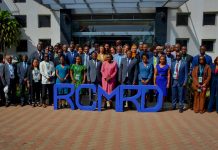Cabo Verde, Mauritius and Seychelles have eliminated measles and rubella, becoming the first sub-Saharan countries to attain this milestone. They join 94 and 133 others globally verified as having eliminated the two diseases, respectively.
The African Regional Verification Commission verified the three countries for Measles and Rubella Elimination, established by the World Health Organization (WHO).
Measles and rubella are highly contagious airborne viruses that can be prevented through vaccination. Measles can result in severe complications and death, especially among young children, and rubella can cause irreversible birth defects if infection occurs during pregnancy.
The achievement by the three countries follows the regional commission’s recommendation, issued at its October 2025 meeting in Johannesburg, South Africa. After reviewing comprehensive programmatic and surveillance data, the commission confirmed that the three small island developing states have interrupted endemic transmission of both viruses for more than 36 months, while maintaining high-quality disease surveillance systems capable of rapidly detecting and containing any imported cases.
“This is a major public health achievement. Congratulations to Cabo Verde, Mauritius and Seychelles on this important milestone in our collective efforts to control and end diseases in Africa. It shows what’s possible when countries put prevention first and make vaccines a priority,” said Dr. Mohamed Janabi, WHO Regional Director for Africa. “We must build on this success so that every child in Africa can grow up healthy and protected.”
Cabo Verde has fully funded its immunization programme since 1998 and maintained coverage above 90% for two decades. Strong political engagement on immunization, especially towards measles and rubella, has been critical in ending the local transmission of the two diseases. The country has not had a confirmed measles case since 1999. The last confirmed rubella cases were in 2010.
“Today, we stand together at a truly historic moment—not only for Cabo Verde, but for the entire African region,” said Honourable Jorge Figueiredo, Minister of Health, Cabo Verde. “This achievement is a testament to what is possible when governments, health professionals, communities, and international partners unite behind a common goal. For decades, measles and rubella have threatened the health and futures of our children. Today, we celebrate the end of that threat in our countries.”
In Mauritius, no measles cases have been reported since 2019 and all recent suspected measles and rubella cases were adequately investigated and discarded as non-measles and non-rubella cases. The country responded to a 2018–2019 measles outbreak with renewed vaccination and surveillance efforts. By 2024, measles-mumps-rubella vaccination coverage at the national level reached 98% for the first dose and 96% for the second dose.
“This milestone reflects decades of investment in strong public health systems, unwavering political commitment and the dedication of our health professionals and communities,” said Honourable Anishta Babooram, Junior Minister of Health and Wellness, Mauritius.
“Elimination is not the end of the journey. Sustaining this status requires constant vigilance, rapid detection and immediate response to any imported case. Mauritius remains fully committed to maintaining high vaccination coverage, strengthening cross-border health security and reinforcing early warning systems,” she added.
Seychelles has maintained over 95% coverage for the first and second measles vaccine doses for more than two decades, supported by vigilant surveillance, laboratory confirmation and health screening at points of entry. The last measles outbreak was contained in 2020. No rubella cases have been confirmed since 2016.
“This sustained effort has not been without its challenges but through the dedication of our Extended Programme on Immunization team, we have successfully kept measles and rubella transmission at bay for decades,” said Honourable Marvin Fanny, Seychelles Minister of Health. “I am proud to announce that … Seychelles was certified as measles and rubella free, a monumental achievement for our nation.”
Since 2001, countries across the African region have implemented measles control strategies that include providing two primary vaccine doses, conducting periodic mass vaccination campaigns, intensive disease surveillance and improved outbreak response as well as clinical care for measles cases. Between 2000 and 2023, these efforts are estimated to have prevented almost 21 million deaths, a 79% reduction in estimated annual deaths during this period.
Over the years, immunization coverage across the region has increased. In 2024, coverage of the first dose of the measles-rubella vaccine reached 71%, up from 67% in 2022, while coverage of the second dose rose from 43% to 55% in the same period. In 2024, five countries—Botswana, Cabo Verde, Mauritius, Rwanda and Seychelles—have achieved the 95% coverage benchmark needed to interrupt transmission.
Under the Measles and Rubella Partnership, of which WHO is a founding member, coordinated efforts aim to achieve a world without measles and rubella. Led by WHO, UNICEF, the American Red Cross, the Gates Foundation, Gavi, the Vaccine Alliance, the UN Foundation and the US Centers for Disease Control and Prevention, the partnership works with countries to raise vaccination coverage, fund, plan, implement and monitor quality supplementary campaigns, investigate outbreaks and provide technical and financial support for effective outbreak response and support a global laboratory network for measles and rubella.





